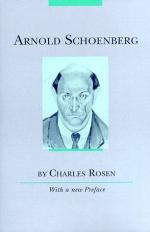|
This section contains 5,435 words (approx. 19 pages at 300 words per page) |

|
SOURCE: "Music and the Modern Imagination: Nietzsche and Schoenberg," in Fullness of Dissonance: Modern Fiction and the Aesthetics of Music, Associated University Presses, 1994, pp. 44-58.
In the following essay, Melnick explores the wider applications of Schoenberg's atonality and Friedrich Nietzche's theory of music to modern art and literature.
Nietzsche is the conclusive nineteenth-century figure for the study of music's tie to modernism, and in this regard he is, next to Beethoven, the most significant, not only for his influence on individual novelists like Proust, Lawrence, and Mann, but for his seminal ideas about dissonance and its tie to listening and reading, and to modern existence itself.
One key to Nietzsche's ideas about music is suggested by his late reflections "contra Wagner," his postulating there that his own writings rather than Wagner's operas were the true focus of his early conceptions of music in The Birth of Tragedy. Here...
|
This section contains 5,435 words (approx. 19 pages at 300 words per page) |

|


